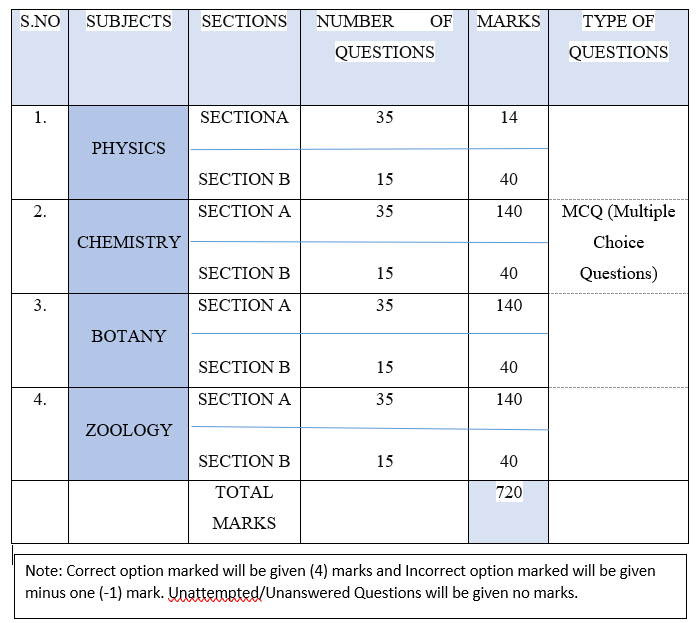NEET: The Whole Idea
National Eligibility cum Entrance Test
(The Central Examination for Medical Admissions in India)
Introduction:
The National Eligibility cum Entrance Test (NEET) is a crucial eligibility exam for students aspiring to enter the field of medicine in India. NEET has replaced multiple state-level medical entrance examinations, offering a unified and standardized assessment for medical admissions. Conducted by NTA, the National Testing Agency, NEET is pivotal for those aiming to pursue undergraduate (U.G.) and postgraduate (P.G.) medical courses in the country.
NEET is an indispensable part of India’s medical education system, ensuring that the admission process is fair, transparent, and merit-based. Aspiring medical students must prepare diligently for NEET to secure their place in the country’s esteemed medical institutions.
Types of NEET:
- NEET-UG (Undergraduate):
- NEET-UG is designed for students seeking admission to undergraduate medical courses, such as MBBS (Bachelor of Medicine, Bachelor of Surgery) and B.D.S. (Bachelor of Dental Surgery).
- NEET-PG (Postgraduate):
- NEET-PG is for graduates who wish to pursue postgraduate courses like MD (Doctor of Medicine) and MS (Master of Surgery). NEET-PG facilitates admission to medical colleges offering these advanced courses.
Mandatory Requirement:
According to the government of India, qualifying for NEET is a mandatory requirement for medical courses in the country. This stipulation underscores the importance of NEET as India’s gateway to medical education.
Exam Mode and Languages:
NEET exams are conducted in pen-and-paper mode. They accommodate a wide linguistic demographic by offering the test in 13 languages. This inclusivity ensures that students from diverse linguistic backgrounds can participate in the examination without language barriers.
Objectives of NEET:
NEET was introduced to streamline the admission process for medical and dental courses across India. Its primary objectives are:
- Uniformity: NEET replaces multiple state-level entrance exams with a single, nationwide test, ensuring a uniform standard for medical admissions.
- Fairness: It aims to provide a level playing field for all candidates, regardless of location.
- Transparency: NEET promotes transparency in the admission process, minimizing chances of malpractices and corruption.
- Merit-Based Selection: The exam ensures that only the most deserving candidates, based on merit, secure admission to medical and dental courses.
Why NEET?
Before NEET was introduced, aspiring medical and dental students had to prepare for multiple entrance exams, each with its syllabus and format. This fragmented approach significantly burdened students, who had to manage varying exam patterns and requirements. NEET simplifies the admission process by consolidating these exams into a single test. This consolidation reduces the pressure on students, allowing them to focus their efforts on one comprehensive exam, ultimately streamlining their path to medical education.
Who is NTA?
The National Testing Agency (NTA) is a self-sustained and autonomous testing organization. Appointed to conduct entrance examinations for admission and fellowship in higher educational institutions, NTA ensures the highest standards of fairness, transparency, and accuracy in testing. Establishing NTA has been pivotal in maintaining the integrity and efficiency of entrance exams like NEET.
History and Evolution of NEET
The National Eligibility cum Entrance Test (NEET) was implemented in India in 2010 to streamline the medical admissions process, assure fairness and transparency, and promote meritocracy. The Medical Council of India first recommended the concept in the early 2000s to address the flaws of the then-existing system. However, the implementation faced substantial legal challenges and objections from various states, leading to historic Supreme Court decisions in 2013 and 2016 that made NEET mandatory for admissions to medical and dental institutes across India.
Since its inception, NEET has undergone various modifications and refinements to improve its effectiveness and inclusivity. Despite its transformative power, NEET faces criticism and challenges, particularly from socioeconomically disadvantaged students and the coaching industry. Nevertheless, NEET remains a cornerstone of medical education, serving as a gateway for students in India aspiring to become medical professionals and contributing to the standards of healthcare delivery.
Pattern and Duration
The NEET exam is designed to last for three hours and 20 minutes. For candidates with physical disabilities (PWBD) who have a limitation in writing, a compensatory time of one hour and five minutes is provided, regardless of whether the candidate uses the Scribe facility. This inclusive measure ensures that all candidates have a fair opportunity to complete the examination.
By simplifying the admission process, ensuring a standardized and fair selection method, and evolving to address challenges, NEET plays a crucial role in shaping the future of medical education in India.
Score Pattern: Important Points to Noten
Section A (Multiple Choice Questions – MCQs):
- Correct Answer or the Most Appropriate Answer: Each correct answer will be awarded four marks (+4).
- Incorrect Answer: Each wrong answer will result in a one-mark (-1) deduction.
- Unanswered/Unattempted Questions: No marks will be awarded (0).
- Multiple Correct Options:
- If more than one option is found correct, four marks (+4) will be awarded to those who marked any of the proper options.
- If all options are correct, candidates who attempt the question will receive four marks (+4).
- Erroneous or Dropped Questions: If a question is incorrect or dropped, all candidates who appeared will be awarded four marks (+4) regardless of whether they attempted the question.
- Calculations: Candidates are advised to use the constants provided (if any) in the questions.
Section B (Multiple Choice Questions – MCQs):
Candidates are required to answer any ten out of fifteen questions. Only the first ten will be evaluated if a candidate answers more than ten questions. The scoring system for Section B is as follows:
- Correct Answer: Every correct answer will be awarded four marks (+4).
- Incorrect Answer: Each wrong answer will result in a one-mark (-1) deduction.
- Unanswered Questions: No marks will be awarded (0).
- Multiple Correct Options:
- If more than one option is found correct, four marks (+4) will be awarded to those who marked any of the proper options.
- If all options are correct, four marks (+4) will be awarded to the candidates who attempted the question.
- Erroneous or Dropped Questions: If a question is incorrect or dropped, four marks (+4) will be awarded to the candidates who attempted the question, irrespective of the nature of the error (human or technical).
- Calculations: Candidates are advised to use the constants provided (if any) in the questions.
By understanding the detailed score pattern, candidates can better prepare and strategize for the NEET exam, maximizing their scoring potential while minimizing negative marking.
Eligibility to Appear in NEET (U.G.)
Age Requirements:
To enroll in the first year of the Undergraduate Medical Course, applicants must be at least 17 years old by December 31 of the same year.
Academic Requirements:
- Students in India:
- They must score at least an aggregate of 50% in Biology or Biotechnology, Physics, and Chemistry in their 12th-grade or equivalent examinations, as specified in the N.M.C. and DCI Regulations.
- Must secure a rank in the NEET (U.G.) – 2024 merit list for admission to Undergraduate Medical Courses.
- Reserved Categories (SC/ST/OBC-NCL):
- Candidates from Scheduled Castes, Scheduled Tribes, or Other Backward Classes (Non-Creamy Layer) must obtain at least 40% in Biology/Biotechnology, Physics, and Chemistry in the qualifying examination.
- Persons with Benchmark Disabilities (PWBD):
- For PWBD applicants, the minimum marks in the qualifying examination in Chemistry, Physics, and Biology (or Zoology)/Biotechnology and Botany taken together shall be 40% instead of 50%.
Upper Age Limit:
As per Letter No. U-11022/2/2022-UGMEB, dated March 09, 2022, received from the National Medical Commission (N.M.C.), under the Graduate Medical Education Board (UGMEB), there is no upper age limit for appearing in the NEET.
Criteria to Qualify NEET:
NEET assesses a candidate’s knowledge of the essential topics of Physics, Chemistry, and Biology. Qualifying for NEET requires more than academic ability; it demands dedication, perseverance, and a genuine interest in healthcare. By meeting the educational and age requirements, candidates pave the way for a rewarding journey into the world of medical education, where they will acquire the knowledge and skills necessary to make a meaningful impact in the lives of others.
As NEET evolves, it remains committed to maintaining high standards of excellence and fairness in medical admissions, ensuring that the best minds have the opportunity to contribute to the noble profession of medicine.
Seats for Undergraduate Medical Courses
The following are the seats available under different quotas:
- All India Quota Seats: The All India Quota reserves government medical and dental college seats.
- State Government Quota Seats: Each state reserves a portion of seats for candidates from within the state.
- Central Institutions/Universities/
Deemed Universities: Seats allocated in central institutions, universities, and deemed universities. - State/Management/N.R.I. Quota places (seats) in Private Medical/Dental Colleges or Private Universities: Seats available under state quotas, management quotas, and for Non-Resident Indians (N.R.I.) in private medical and dental colleges or private universities.
- Central Pool Quota Seats: Seats allocated for specific categories, such as children of armed forces personnel.
- Private Unaided/Aided Minority/Non-Minority Medical Colleges: All seats, including N.R.I. Quota and Management Quota, in private unaided or aided minority and non-minority medical colleges.
- AIIMS Institutes Across India/JIPMER: Seats in All India Institutes of Medical Sciences (AIIMS) and JIPMER-Jawaharlal Institute of Postgraduate Medical Education and Research.
- Counseling by MCC/DGHS: MCC, the Medical Counselling Committee, and the Directorate General of Health Services (DGHS) conduct counseling for successful candidates for:
- 15% All India Quota seats
- 100% seats (including 85% State Quota seats) in Central Institutions (e.g., ABVIMS & R.M.L. Hospital, VMMC & Safdarjung Hospital, ESIC)
- Central Universities (e.g., D.U., B.H.U., A.M.U.)
- AIIMS, JIPMER
- Deemed Universities for Undergraduate Medical/Dental Courses
MCC registers candidates for AFMC and provides their information to AFMC authorities for admission. Universities like D.U. and B.H.U. may utilize the NEET score to offer related courses.
Merits of NEET
- Standardized Assessment: Provides a uniform evaluation for all candidates.
- Merit-Based Selection: Ensures admissions are based on merit.
- Quality Assurance: Maintains high standards in medical education.
- Uniform Curriculum: Enforces a consistent curriculum across institutions.
- Cost-Effective: Reduces the need for multiple entrance exams, saving time and money.
- Reduction of Multiple Exams: Consolidates various state and institutional exams into one, simplifying the process for students.
Rules of NEET
Candidates must adhere to strict rules to maintain the integrity of the exam. The following are considered unfair practices and will result in severe consequences:
- Prohibited Items: Bringing any banned object or equipment, such as stationery, communication devices, accessories, food, decorations, or any other material related or unrelated to the exam.
- Electronic Devices: Using or attempting to use electronic devices after entering the Examination Centre.
Any such actions during, before, or after the exam will be deemed as unfair practices, resulting in:
- Labeling as UNFAIR MEANS (U.F.M.): Candidates engaging in these practices will face a three-year ban from the field.
- Legal Consequences: Candidates may face criminal charges and other appropriate legal actions.
- Cancellation of Results: The results of candidates found guilty of unfair practices will be canceled, and their NEET (U.G.) – 2024 results will not be released.
Result
The National Testing Agency (NTA) will post scanned images of O.M.R. Answer Sheets and machine-generated responses for all applicants on its website (https://exams.nta.ac.in/NEET)
The NTA will assess the Answer Sheets using conventional procedures. The results will be published on https://exams.
Other central and state government entities may use the NEET (U.G.) – 2024 Result by their eligibility requirements, norms, regulations, guidelines, and rules. The outcome data may also be used for B.Sc. (H) nursing courses, subject to their respective eligibility criteria, norms, regulations, guidelines, and rules. Additionally, the NEET (U.G.) – 2024 data will be utilized to admit students to BVSc and A.H. courses in approved Veterinary Colleges under the V.C.I.’s 15% quota. The Council must approach the MCC of DGHS & MOHFW to receive the data on the outcomes above.
The Other Side of NEET
The National Eligibility and Entrance Test (NEET) has received widespread criticism, with numerous stakeholders expressing concerns about its implementation and potential implications. NEET encountered significant legal obstacles, especially in its early years. Several states, including Tamil Nadu, protested the introduction of NEET, claiming it violated their right to conduct separate medical entrance tests.
Opponents of NEET have expressed concern over the socioeconomic inequities it could exacerbate. They argue that students from economically disadvantaged families may need help accessing quality coaching, study materials, and resources required to adequately prepare for NEET, putting them at a disadvantage compared to their more fortunate counterparts. NEET benefits economically wealthy and metropolitan children more significantly.
Moreover, the intense competition associated with NEET places enormous pressure on students to perform well, potentially leading to increased tension, anxiety, and even mental health problems. The high stakes of the exam create a stressful environment that can affect candidates’ well-being.
Despite these challenges, NEET remains a cornerstone of medical education in India, aiming to provide a standardized, merit-based selection process for aspiring medical professionals. The ongoing evolution of NEET seeks to address these criticisms and improve the inclusivity and fairness of the examination system.
Frequently asked questions
| Questions | Answers |
| Time Duration | 3 hours and 20 minutes |
| Format | 200 multiple-choice questions (MCQs) |
| Languages |
13 languages [English, Hindi, Assamese, Bengali, Gujarati, Kannada, Malayalam, Marathi, Odia, Punjabi, Tamil, Telugu and Urdu] |
| courses | MBBS, BDS, BAMS, BVSC & BSC-Nursing |
| Score validity [India] | One year |
| Score validity [Abroad] | Three years |
| Age limits |
Minimum age: 17 years as of the year of the exam. There is no maximum age limit for appearing in NEET |
| frequency | NEET is conducted annually, typically in May. |
| Mode | Offline mode (pen and paper mode) |
| Colleges Accepting NEET | Medical colleges across India require NEET scores for admission into their undergraduate programs. |
| Eligibility Criteria | Indian candidates must secure a minimum aggregate of 50% in Physics, Chemistry and Biology/Biotechnology in their 12th standard or equivalent examinations. |
| Total score | 720 marks |
Hints/Tips for NEET Preparation
Focus on Conceptual Understanding
Prioritize comprehending the fundamental ideas of Physics, Chemistry, and Biology over rote memorizing. A solid conceptual grasp will help you answer various test questions more effectively and confidently.
Create a Study Plan
Develop a comprehensive study schedule that includes allocated time for each subject. Give more time to complex topics while making regular changes to enhance learning. Set realistic goals and milestones to monitor your progress efficiently. A well-structured plan will keep you on track and help you manage your study time effectively.
Invest in Quality Study Materials
Invest in high-quality study materials, textbooks, and reference guides professionals recommend. Explore online resources, instructional apps, and video lectures to augment learning and better understand crucial concepts. Reliable resources can provide varied explanations and help solidify your knowledge.
Understand the Syllabus
Familiarize yourself with the NEET syllabus covering Physics, Chemistry, and Biology (Botany and Zoology). Divide the topics into manageable sections and prioritize them according to your strengths and weaknesses. Knowing the syllabus thoroughly will help you focus on essential areas and ensure comprehensive material coverage.
Conclusion
In summary, the NEET provides a uniform assessment procedure for entry into medical and dental universities throughout India, making it a vital first step for prospective medical professionals. While it strives to maintain equity and meritocracy, challenges persist, particularly concerning inequalities in preparation and accessibility. Efforts must be made to overcome these challenges and provide equal opportunities for all aspirants.
Ultimately, NEET serves as a testament to the excellence in medical education India aspires to achieve, aiming to develop skilled and knowledgeable healthcare workers dedicated to serving society. By understanding the exam’s requirements, preparing diligently, and utilizing effective study strategies, candidates can navigate the NEET journey successfully and contribute to the healthcare field with competence and commitment.
Source link
All Materials on this website/blog are only for Learning & Educational purposes. It is strictly recommended to buy the products from the original owner/publisher of these products. Our intention is not to infringe any copyright policy. If you are the copyright holder of any of the content uploaded on this site and don’t want it to be here. Instead of taking any other action, please contact us. Your complaint would be honored, and the highlighted content will be removed instantly.








